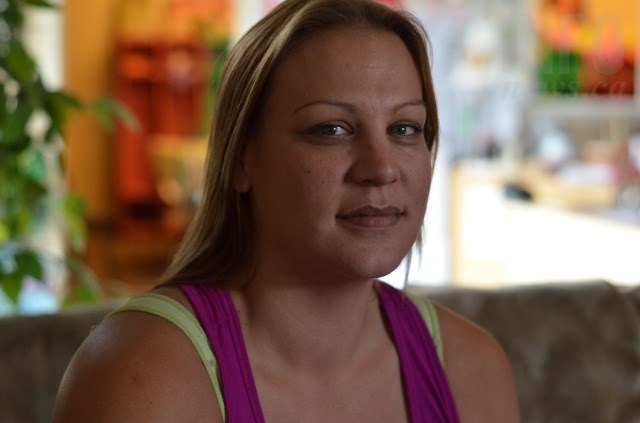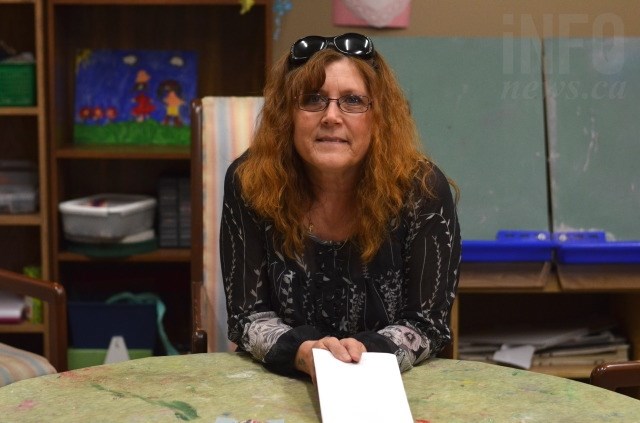
Vernon mother Tera Elliot is desperate to get help for her son, who struggles with a combination of mental health issues.
(CHARLOTTE HELSTON / iNFOnews.ca)
June 22, 2016 - 9:00 PM
'IT'S THE HARDEST THING TO DO'
VERNON - After trying to get help for her teenage son for months, Vernon mother Tera Elliot was forced to do something she feels no parent should ever have to do — call the police and have her son admitted to the hospital.
Her 15-year-old son struggles with Attention-Deficit Hyperactivity Disorder, Post Traumatic Stress Disorder and a processing disorder. Outbursts are common due to his mental health issues, but on Saturday he got violent and pulled a knife, she says. Afraid for her family’s safety, she made the tough decision to put him in the hospital.
“It’s the hardest thing to do. I shouldn’t have had to do that,” she says.
Her son has been on a waiting list with Child and Youth Mental Health Services since January, and despite many desperate phone calls, she says they are getting nowhere while his mental health and well-being continues to spiral.
The trouble started when Elliot moved her son from Clearwater, where they had been living, to Vernon. He was doing pretty well prior to the move; his grades were good and he was seeing a therapist on a weekly basis, as well as a regular doctor. Child and Youth Mental Health services was coordinating the supports. But it all disappeared when they moved and had to start the process all over again.
Elliot says she met with a Child and Youth Mental Health intake worker in January and was told her son would go on the top priority list to start accessing services.
“Then I kept getting calls saying he was bumped back further and further,” Elliot says.
To this day, she says she still has not received any help for her son. His grades are plummeting, and tensions are worsening at home.
“We lost him,” she says. “That’s him having no supports, no resources, no one to talk to, no one to help deal with the things running through his head, no doctor to realize the meds he’s on are no longer working.”
She’s been getting his prescription medication refilled at a local walk-in clinic, but says doctors there are not equipped to care for his complex mental health issues.
“Hormones change, your resistance to medications changes. That’s why you get a specialized doctor, they know what to look for, how to increase or decrease the medication,” she says.
When they were living in Clearwater, her son had a designated intake worker who helped set up his doctors, counselling and everything else he needed. That’s what Elliot thought would happen in Vernon, but after nearly six months they are still waiting. If he’d been getting help, she believes things wouldn’t have escalated to the point where she had to put him in the hospital.
“It’s heartbreaking not just for my son, to see what he’s going through, but to see how many families are going through the same thing, some of them worse,” she says.
She could take her son to private specialists and therapists, but it’s not cheap.
“The only other option is selling everything so you can afford to pay for those resources,” she says.
NOT ALONE

House of Dwarfs Daycare operator Sherry Lynn Morrical says it's all too common to hear about long waiting lists from parents.
(CHARLOTTE HELSTON / iNFOnews.ca)
Local daycare operator Sherry Lynn Morrical has sadly seen it all before and when she heard of Elliot's pleas for help, she reached out to let her know she's not alone. At her Vernon business, House of Dwarfs Daycare, she hears stories of long waitlists and not enough government help on a weekly basis.
“Some parents, you look at them and tears are welling up,” Morrical says. “The government resources just aren’t out there.”
Many of the children at the daycare require extra assistance due to mental or behavioural challenges, and in Morrical’s experience the wait list for government aid is substantial.
“The waitlists are so long that sometimes people have to wait several months before they’re seen or assessed in some cases,” she says.
Having worked in child care for 30 years, Morrical says the longer the wait, the harder things become.
“If they fall through a crack, chances are the older they get, the more difficult the problems will be and the harder it will be to overcome whatever barrier they’re facing,” she says.
In her view, local organizations like the North Okanagan Neurological Association and North Okanagan Youth and Family Services Society do their best, but there is simply not enough government funding coming down the pipe. After seeing so many parents struggle, she's decided to contact the Canadian Federation of Independent Business to see if they will help lobby the government for more funding for child and youth mental health.
“In an ideal world, when a child needs something it’s dealt with when it’s needed — not when it becomes a crisis,” she says.
WAIT TIMES VARY
No one from the Ministry of Children and Families was available for an interview, but we did receive a written statement from a spokesperson.
“All Child and Youth Mental Health clients are screened, assessed and triaged for service based upon their presenting need, individual situation and severity. A priority approach is followed, although the date of referral is also a consideration. Crisis and emergency clients are not placed on waitlists.”
While there is no wait list for the initial consultation with an intake worker, there are some circumstances in which service delivery ‘may not be instantaneous’ the ministry says. That might be because the client does not present with a severe mental health disorder, because they are awaiting specialized services or because they have other supports available through an Employee Assistance Program, or elsewhere. The client’s issue may also be situational versus chronic and persistent, they may be well supported in the community, or the clinician might be waiting for previous assessments or more information to arrive to develop an appropriate treatment plan.
“Wait times vary based upon severity, circumstances, availability of specialized service and priority for service,” states the ministry.
In Vernon, the ministry has one team leader, seven clinicians, and one psychologist on staff. The Family Resource Center is the primary contractor for child and youth mental health services and has three staff that provide therapeutic services. There are also three psychiatrists who contract with the ministry to provide services.
“In addition there are monthly meeting with multiple service providers and representatives from Interior Health and the School District that support the… clinical team and offer direct services to many families.”
Waitlists in Vernon are reviewed weekly.
To Elliot, more help is needed, and needed now.
“If we neglected our kids like the government is neglecting us, we’d go to jail,” she says.
To contact a reporter for this story, email Charlotte Helston or call 250-309-5230 or email the editor. You can also submit photos, videos or news tips to the newsroom and be entered to win a monthly prize draw.
We welcome your comments and opinions on our stories but play nice. We won't censor or delete comments unless they contain off-topic statements or links, unnecessary vulgarity, false facts, spam or obviously fake profiles. If you have any concerns about what you see in comments, email the editor in the link above.
News from © iNFOnews, 2016